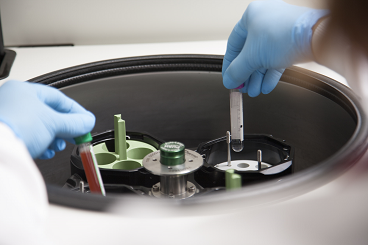The TRALA trial – targeted radiation
 A new technique developed by the Targeted Radiotherapy Group at the Southampton ECMC has outstanding implications for delivering very precise and focused treatment to malignancies in bone marrow. This would revolutionize radiation therapy for this type of cancer, as it would avoid irradiating healthy organs in compromised individuals.
A new technique developed by the Targeted Radiotherapy Group at the Southampton ECMC has outstanding implications for delivering very precise and focused treatment to malignancies in bone marrow. This would revolutionize radiation therapy for this type of cancer, as it would avoid irradiating healthy organs in compromised individuals.
The AntiCd66 radiation dose escalation study (TRALA) is based on a new technique of preparing patients for transplantation using a radio-labelled monoclonal antibody that targets the bone marrow allowing very precise delivery of high radiation doses to the site of disease, in this case the clonal plasma cells. In a randomised phase II clinical trial, targeted radiotherapy is delivered by an Yttrium 90 radiolabelled anti-CD66 monclonal antibody with high dose melphalan compared to melphalan alone, prior to autologous stem cell transplantation for multiple myeloma.
The study, funded by Leukaemia and Lymphoma Research (LLR) and the National Amyloidosis Centre (NAC) based at the Royal Free Hospital in London, is a stunning display of the usefulness of the ECMC network. It will run for 40 months at four ECMC sites in the UK: Southampton, Royal Free Hospital/University College London (UCL), Newcastle and Birmingham. The Southampton group will provide essential technical support with treatment delivered in Southampton and the Royal Free Hospital (UCL ECMC). The trial is based on several years of pre-clinical and clinical research using the radio-labelled monoclonal antibody in patients undergoing autologous or allogeneic stem cell transplantation for haematological malignancies.
“The group have shown that very high doses of radiation can be safely delivered to the bone marrow with minimal radiation to other organs. If successful, the results of the study will be used to support a larger Phase II trial expanded to include more ECMCs in the UK,” said Dr Kim Orchard, Southampton ECMC.
Targeted Radiotherapy in the Conditioning Prior to Haematopoietic Stem Cell Transplantation Blood (ASH Annual Meeting Abstracts) 2005 106: Abstract 2189
